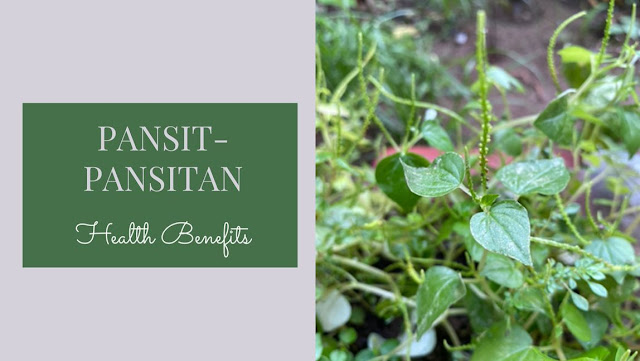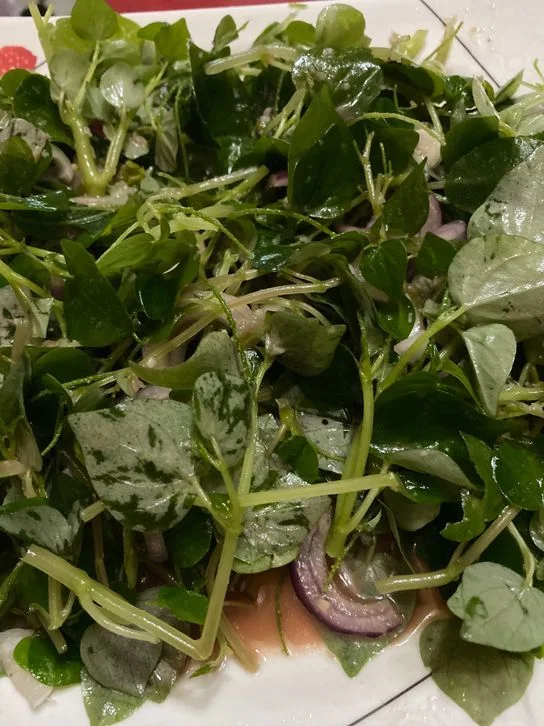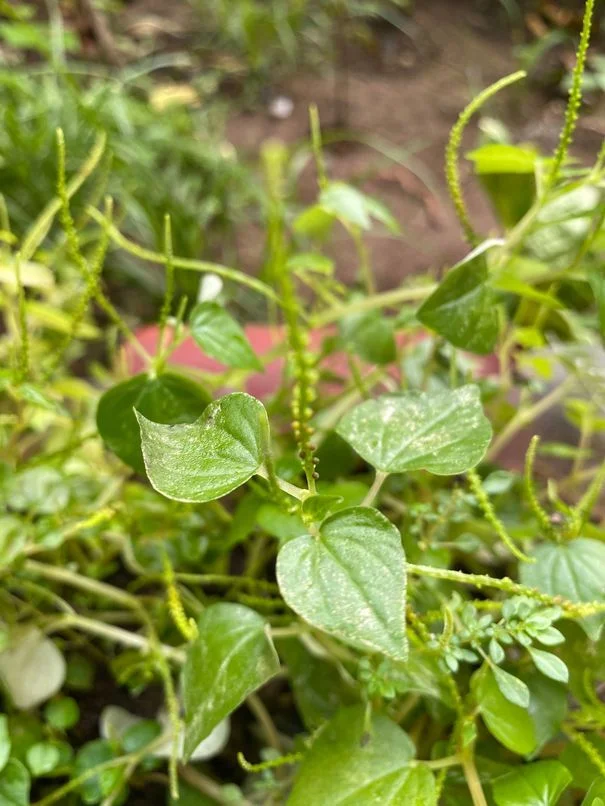
Pepper elder or pansit-pansitan is a delicious herb packed with a lot of health benefits, including treatment for gout and high-blood pressure.
Pepper elder (Peperomia pellucida), more commonly known among Filipinos as pansit-pansitan or ulasimang bato (Tagalog), olasiman ihalas (Bisaya), sinaw-sinaw (Bikol), and lin-linnaaw (Ilocano), just to mention a few, is an herb that grows wild and abundant in most gardens and practically anywhere else.
Pansit pansitan is thought of by many people as a weed or a type of grass that makes them feel uneasy or apprehensive about consuming it. However, it is not grass but an herb and may be eaten as a vegetable. Not only that, it does taste good!
Pansit-pansitan leaves are small and heart-shaped and can be easily added to soups, salads, and other meat and vegetable dishes. It complements and enhances the flavor of other ingredients, so it’s really pleasant to the taste.
Pansit-pansitan’s texture and flavor
Pansit-pansitan has a pleasing mild peppery taste, similar to a radish but really subtle. It does not taste bitter at all, so it just needs to be washed thoroughly to remove dirt and can be eaten as-is with a light dressing or mixed with other green leafy vegetables as a salad. Pansit pansitan has a satisfying crunch, which is why it is popularly prepared as a salad dish in many parts of Southeast Asia.
Anyway, I recently thought of preparing pansit-pansitan at home for my in-laws because I see a lot of it growing in our garden and I wanted a healthy dish on our table that can address high blood pressure, arthritis, gout, and general inflammation in the body.
I know pansit-pansitan because it is a common vegetable in our town in Nueva Ecija but is most often prepared as tea or decoction, meaning the plant is boiled in water to extract its healthy components. It is then drunk as a health drink for overall physical wellness. The root, most especially, is regarded as the most potent part of the plant.
Introducing pansit-pansitan to my companions at home
To be honest, it was also my first time eating pansit-pansitan, but I was perfectly fine with it because I knew of it as an edible and quite delicious plant.
So I prepared a salad for my in-laws, the usual way that we prepare our salads at home for them to feel comfortable eating it. Honestly, it took us a bit of convincing for them to try it, and after the initial apprehension, they actually thought that it tasted good and wanted me to regularly prepare it as a side salad.
If you are like my in-laws, who are not familiar with pansit-pansitan, I do hope that you would reconsider it for its health benefits as well as its wonderful flavor.
Pansit-pansitan (peperomia pellucida) health benefits
- It can help treat gout
- It can help relieve rheumatism
- It may help address hypertension
- It is also used to treat renal disorders such as urinary tract infection
- It can help cure pimples when mashed and applied topically to affected areas
These are just some of the health benefits of pansit-pansitan that struck me. However, it has countless other benefits that range from treating eye inflammation to burns and wounds, to headaches.
Pansit-pansitan salad
Here is a simple salad recipe on how I prepare pansit-pansitan at home:
Ingredients:
- A good bunch of pansit-pansitan (you can just pick the stems and leaves and leave the root in the soil)
- 3 medium ripe tomatoes
- 1 medium white onion (you may use 2 medium red onions if unavailable)
Dressing:
For the dressing, I decided to make it all Filipino with a bagoong-calamansi sauce but you can also use a vinaigrette, olive oil, or Gochujang (Korean chili paste).
Here’s what you will need for the bagoong-calamansi dressing:
- Juice from 5 pieces calamansi or half of a medium-sized lemon
- 2 pieces chili, chopped
- 2 cloves garlic, grated
- Half a piece of ginger, grated
- Fish bagoong (Balayan or Pangasinan)
Procedure:
- Wash the pansit-pansitan at least twice in clean water and cut them into smaller pieces.
- Chop the tomatoes and the onions.
- For the sauce, combine the calamansi juice, grated garlic, ginger, and chopped chili, and gradually add the bagoong until you get the desired flavor.
- Toss all the ingredients together until all the vegetables are coated with the dressing. You may serve this immediately or chill before serving it.
Print and file this recipe
If you want to print a copy of this pansit-pansitan salad recipe, you can do so using this recipe card:
Rated 3.7/5 based on 14 customer review(s).

Simple, fast, and delicious pansit-pansitan salad.
Ingredients:
- A bunch of pansit-pansitan (leaves and stems)
- 3 medium ripe tomatoes
- 1 medium white onion or 3 medium red onions
- Juice from 5 pieces of calamansi
- 2 pieces chili
- 2 cloves garlic, grated
- half a piece of ginger, grated
- fish bagoong (Balayan or Pangasinan)
Instructions:
- Wash the pansit-pansitan at least twice in clean water and cut them into smaller pieces.
- Chop the tomatoes and the onions.
- For the sauce, combine the calamansi juice, grated garlic, ginger, and chopped chili, and gradually add the bagoong until you get the desired flavor.
- Toss all the ingredients together until all the vegetables are coated with the dressing. You may serve this immediately or chill it before serving.
- Serve during breakfast.
Epilogue
Pansit-pansitan is an easily accessible herb that is packed with a lot of health benefits. It is delicious and quick to prepare.
 |
| Fresh pansit-pansitan |
Are you familiar with pansit-pansitan? Have you tried this before? If you have recipes that use pansit-pansitan, share them in the comment section below.











